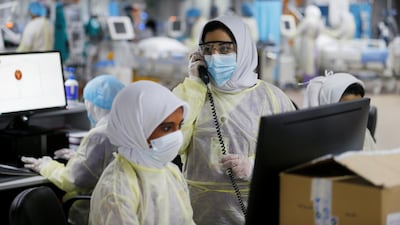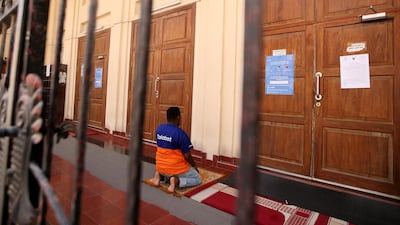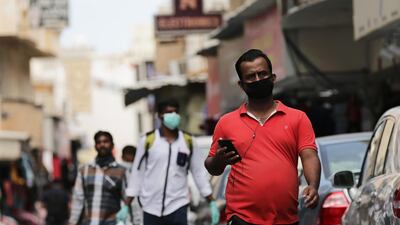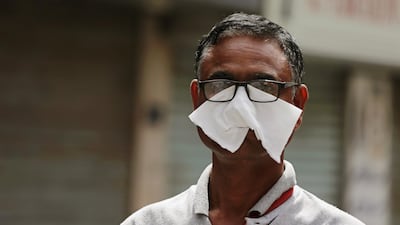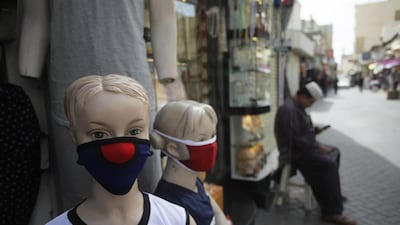An anti-viral Covid-19 drug approved for emergency use in Bahrain has been hailed a "major breakthrough" in the country's fight against the pandemic.
Pfizer’s paxlovid was registered by authorities last month and is viewed by doctors as key to supporting patients at high risk of suffering serious complications.
The pill is taken orally and, if given to patients in the first five days of illness, has been shown to cut hospitalisations by 89 per cent. It is a combination of Pfizer’s investigational antiviral PF-07321332 and a low dose of ritonavir, an antiretroviral medication traditionally used to treat HIV.
Bahraini medics are preparing for the drug to be delivered to the country in order to begin treating patients.
National Medical Taskforce for Combating Covid-19
Viral treatments, like GSK’s sotrovimab – successfully introduced in the UAE last year – and molnupiravir from Merk, have armed medics with additional weapons to treat the virus.
But vaccines and regular boosters are the most effective options to help nations pull out of the pandemic, said Dr Jameela Al Salman, consultant of infectious diseases at Salmaniya Medical Complex and member of the National Medical Taskforce for Combating Covid-19
“After two years into the pandemic this is a major breakthrough, and we are now looking at how we can prevent complications,” said Dr Al Salman.
No substitute for vaccine
“This will not replace vaccines, that will remain very important.
“From our local data, we know vaccines and boosters are very effective.
“Vaccines will not limit the numbers getting infected, but will decrease hospital admissions and those in ICU," she said.
“This is what we are focusing on now.”
Bahrain has recorded 383,000 cases in a population of 1.7 million - meaning at least one in five residents have had the virus.
Despite that, the death toll stands at just 1,408. That can be put down to a young population - the median age is just 32 - and swift medical treatment in a coalition of public and private hospitals.
Since the start of the pandemic, the country’s ICU bed capacity has increased from 100 to 700, although most are now empty.
Paxlovid is recommended for adults who have mild to moderate symptoms and are at a higher risk of developing severe illness and hospitalisation.
That includes those with existing chronic heath conditions like diabetes or hypertension, the obese, elderly and unvaccinated.
It was authorised for emergency use in December by the US Food and Drug Administration.
During trials, just 1 per cent of patients who took the drug were hospitalised after 28 days, compared to 6.7 per cent who took a placebo.
Omicron puts nations on high alert
Since Omicron was first identified just 10 weeks ago, almost 90 million cases have been reported to the World Health Organisation – more than in the whole of 2020.
But Denmark has removed all coronavirus restrictions, despite current infections 12 times higher than its previous peak in December 2020.
Thanks to the country’s high vaccination booster rate, where 81 per cent are fully protected and 60 per cent boosted, few are in hospital.
Almost all domestic restrictions have also been lifted in the UK, as community immunity strengthens and the virus appears to weaken.
Caution remains
In Bahrain, restrictions continue and the country is adopting a more gradual approach to recovery.
Establishments require a ‘green shield’ entry pass on the BeAware app, masks remain compulsory and temperature scanners are used in buildings.
Arrivals at the new Bahrain International Airport on Muharraq Island must take a PCR test on landing and isolate until a negative result is received.
The unvaccinated, including younger children, pregnant women and those unable to take the vaccine due to medical conditions or cultural beliefs, remain at risk.
Bahrain made the Sinopharm vaccine available for children aged 3 to 11 in October and approved the Pfizer BioNTech jab for the 5-11 age group the following month.
While anti-viral drugs in the early stages of infection could be vital to the safety of unvaccinated patients, Dr Al Salman urged parents to protect their children.
“Initially we did not know who would have complications and would be more likely to die,” said Dr Al Salman.
“To have pills to take for disease is amazing as it can be used early in high risk patients when there are only mild symptoms.
“The community needs to be part of the recovery process, so they must trust the information so they listen to our recommendations.
“The vaccine is very important for kids. The argument is that children are at low risk from serious illness," she said.
“The majority of cases are mild in children, but there are certain cases of multi-system inflammatory syndrome in children with Covid that has seen healthy children die within hours.
“Also children can carry the virus and pass it to others who are immunocompromised.
“To close this cycle of prevention, children need to vaccinated.”
